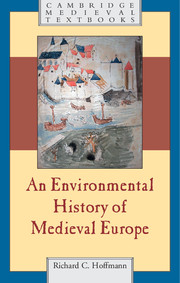Book contents
- Frontmatter
- Contents
- List of figures
- List of maps
- Preface
- Frontispiece: Nature and culture at Waterford, Ireland, 1372
- Introduction: Thinking about medieval Europeans in their natural world
- 1 Long no wilderness
- 2 Intersecting instabilities: culture and nature at medieval beginnings, c.400–900
- 3 Humankind and God’s Creation in medieval minds
- 4 Medieval land use and the formation of traditional European landscapes
- 5 Medieval use, management, and sustainability of local ecosystems, 1: primary biological production sectors
- 6 Medieval Use, management, and sustainability of local ecosystems, 2: interactions with the non-living environment
- 7 ‘This belongs to me . . .’
- 8 Suffering the uncomprehended: disease as a natural agent
- 9 An inconstant planet, seen and unseen, under foot and overhead
- 10 A slow end of medieval environmental relations
- Afterword
- A sampler for further reading
- Index
Afterword
Published online by Cambridge University Press: 05 July 2014
- Frontmatter
- Contents
- List of figures
- List of maps
- Preface
- Frontispiece: Nature and culture at Waterford, Ireland, 1372
- Introduction: Thinking about medieval Europeans in their natural world
- 1 Long no wilderness
- 2 Intersecting instabilities: culture and nature at medieval beginnings, c.400–900
- 3 Humankind and God’s Creation in medieval minds
- 4 Medieval land use and the formation of traditional European landscapes
- 5 Medieval use, management, and sustainability of local ecosystems, 1: primary biological production sectors
- 6 Medieval Use, management, and sustainability of local ecosystems, 2: interactions with the non-living environment
- 7 ‘This belongs to me . . .’
- 8 Suffering the uncomprehended: disease as a natural agent
- 9 An inconstant planet, seen and unseen, under foot and overhead
- 10 A slow end of medieval environmental relations
- Afterword
- A sampler for further reading
- Index
Summary
Medieval Latin Christendom had an environmental history. How people engaged with nature had a bearing on their lives and their fate. This book means to show students, practitioners, and consumers of medieval studies and environmental studies this simple truth. The interaction of European nature and medieval culture writ large mattered then and says something of moment to those who would now listen. All three central themes of environmental history – environmental influences on human activity, human attitudes towards the natural world, and human impacts on the non-human – pertain to stories and outcomes interlaced through a millennium of Europe’s past. Those narratives deal with problems of resource use, ecological balance, pollution, and values and equity in environmental relations. They illuminate similarities, differences, and diversities among past and present human experiences with natural processes and objects, whether those are now approached from a current analytical perspective or from as much as can be reconstructed of a medieval stance where central concepts were not as today’s. Medieval environmental history also makes another contribution: its methods of drawing robust inferences about past events and conditions from surviving verbal and material artefacts and from traces preserved in nature constitute a call for enlarging interdisciplinarity in medieval studies. Respectful collaboration among medievalists, environmental scientists, and palaeoscientists is necessary to recapture lives, thoughts, and activities of medieval Europeans and the evolution of European nature in millennia before our own. By trying to exemplify what is known or reasonably surmised and what might be worth exploring, the present book advocates cooperation and shared learning among humane and scientific investigators, neophyte and veteran alike.
- Type
- Chapter
- Information
- An Environmental History of Medieval Europe , pp. 371 - 377Publisher: Cambridge University PressPrint publication year: 2014



